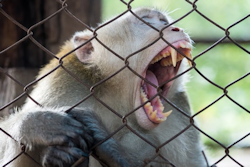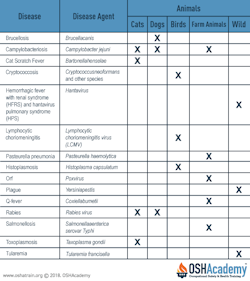Wild and Domesticated Animals
Wild rodents and other wild animals may inflict an injury such as a bite or scratch.
Workers need to receive training on the correct way to capture and handle any wild animals. While they may carry or shed organisms that may be potentially infectious to humans, the primary health risk to individuals working with captured animals is the development of an allergy.
The development of disease in the human host often requires a preexisting state that compromises the immune system. Workers who have an immune compromising medical condition or who are taking medications that impair the immune system (steroids, immunosuppressive drugs, or chemotherapy) are at higher risk for contracting a rodent disease.
- Wild rodents may act as carriers for viruses such as Hantavirus and lymphocytic choriomeningitis virus (LCMV) depending on where they were captured.
- Each rodent species may harbor their own range of bacterial diseases, such as tularemia and plague. These animals may also have biting insect vectors which can act as a potential carrier of disease (mouse to human transmission).
- Examples of zoonotic diseases that can be transmitted from wild and domesticated animals to humans are listed in the chart to the right.

Non-human Primates
It should not be surprising that, given our many similarities, humans and non-human primates are susceptible to similar infectious agents. Because of our differences, the consequences of infection with the same agent often vary considerably. Infection may cause few if any symptoms in one group and may be lethal to the other. Exposures to body fluids from non-human primates should be treated immediately.
Knowledge Check Choose the best answer for the question.
7-4. Workers who have an immune compromising medical condition or who are taking medications that impair the immune system _____.
You forgot to answer the question!

